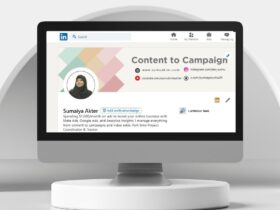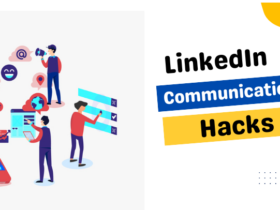It makes sense. Instagram, Facebook, and TikTok all have huge audiences, instant involvement, and an endless stream of possible customers.
On the other hand, what if I told you that relying too much on social media could hurt your business? I know it’s a big claim, but hear me out. Twitter and Facebook are useful, but they must be more vital to build your whole company.
It might even be dangerous. What happens if the rules change or if your account is shut down? In the blink of an eye, your customers and brand recognition could be gone.
We’ll look at why your firm needs its own brand outside of social media, how to create a brand that will weather platform changes, and offer practical tips to help you secure your business in the long run.
Let’s ensure that your business not only survives but thrives—both online and offline.
Social Media Isn’t Enough: Here’s Why Your Business Needs Its Own Identity
In this digital world, many businesses start using social media sites when they want to have an online profile. Social media is the best place to reach and interact with customers since billions of people use it daily.
But even though these platforms give you unmatched chances to be seen, depending on them alone to run your business can be risky and short-sighted.
Let’s discuss Why companies get caught up in the social media trap.
The Promise of Easy Wins
Social media channels provide a seductive promise for fast success. They give quick access to a large audience and are reasonably priced and user-friendly.
With a few clicks, your company may be live on Facebook, Instagram, or TikTok, attracting possible clients who are just as readily interactable with an introductory post or story.
Startups and small businesses with few resources like social media a lot because it is easy to use and companies can get started right away in seeing benefits.
There may be quick gains on social media, like a sudden rise in likes, shares, or friends, but these gains may only last for a short time.
Because the formulas that decide what people can see are always changing, what works today might not work tomorrow. This instability is very bad for businesses that depend on social media for most of their work.
The False Sense of Ownership
Another reason firms turn to social media is the perception of ownership. When you have a large following on a platform, it’s tempting to believe you own that audience.
However, you are only renting space on a platform that someone else owns. The terms of service, algorithm tweaks, and policy revisions are beyond your control.
If a platform decides to close your account or modify how information is disseminated, your company may lose its primary connection to clients overnight.
Social media platforms give priority to their interests, which might not always align with yours. A corporation may suffer from this loss of control, particularly if it has invested a lot of money in building its brand on a single platform.
This is why it is critical to create a brand identity that is not dependent on the whims of social media giants.
Social Media’s Fluctuation
Social media is unstable by nature. Trends change very quickly, and what’s popular today might not be remembered tomorrow.
Businesses that only use social media must constantly change to keep up with new trends, which can be difficult and take a lot of time and money.
Because of this, it’s easier to build a steady brand image when you’re always looking for the next big thing instead of long-term growth.
Also, social media sites often change their rules and features, which could hurt your business in ways you didn’t mean.
For example, if your privacy regulations change, gathering and using consumer data may become more challenging, influencing how you sell your company.
Because social media is so unpredictable, keeping to a long-term business plan requires a significant amount of effort.
Platform Dependency
One of the biggest risks of relying only on social media is becoming dependent on the platform. As long as your business plan depends on just a few social networks, you’ll be affected by any changes those networks make.
Changes to the algorithms may drastically reduce the exposure of your postings, making it harder for readers to locate your content.
Sometimes, algorithm updates cause businesses’ involvement to decline by more than 50%, which may be disastrous if social media is their only marketing tool.
Social networking sites can also choose to suspend or restrict accounts for various reasons—sometimes without notice.
If your company account is abruptly disabled, you might lose access to your followers, material, and even clientele.
In the long term, this type of platform reliance is dangerous and unsustainable.
Loss of Direct Customer Relationships
If most of your business is done on social media, you might lose touch with your customers directly. Social media has mediators between you and your audience, so you need control over how you talk to your customers.
You might need access to customer email addresses or other ways to contact them, making it harder to get them to stick with you.
You can’t always reach everyone on social media because the sites themselves choose who sees your posts.
This can weaken the connection between your brand and its audience, making it harder to build trust and get people to buy from you again.
Independent Business Identity Power
An independent business identity is the cornerstone of building a unique brand in a crowded marketplace. In a world where differentiation is vital, an independent business identity is a powerful asset that drives long-term success and resilience.
The Benefits of a Standalone Brand
Setting up a unique name has many benefits. For starters, it makes your company look like a trustworthy one. People are more likely to trust your business if you have a website, uniform branding, and different ways for people to get in touch with you. To turn potential buyers into faithful ones, you need to earn their trust.
An independent brand also gives you complete power over your interactions with customers. No moving algorithms or platform rules affect how and when you can talk to your public.
The power to handle customer information allows you to tailor your marketing and connect with your customers more deeply.
Having your own business name also makes sure that your brand is the same in all forms of media. You should talk, believe, and send the same words to your customers whether they talk to you on social media, visit your website, or get an email.
This stability not only helps people remember your business, but it also gives your brand a personality and sets you apart from competitors.
What It Means to Have Your Own Identity
The image of a business that goes beyond social media is known as “independent.” It has to do with making a brand that has a clear message, a unique look, and a clear value claim.
From your website and logo to your marketing tools and the way you talk to people, everything about your business should show who you are.
No matter what happens on social media, your business can keep its influence and image if it has its own identity.
Customers will know and trust your company even when they don’t interact with you on social media if you have your personality.
It’s about doing a business that people can connect with, one that gives them something unique and useful and isn’t tied to any medium.
However, despite the fact that social media is a wonderful tool for businesses to engage with their audience in the fast-paced digital world of today, it should be a different component of your company plan.
If you only use social media for your business, it could be affected by changes you can’t control. Building a solid brand that does well online and offline can be done by giving your business a clear value proposition, a professional website, a strong email list, and consistent branding.
Remember that social media shouldn’t be the central part of your business plan; it should work with it.
It is possible to assure that your company will continue to be robust, stable, and profitable for many years to come if you take control of the personality of your brand and extend your presence on the internet.





Leave a Reply